|
|
|
Sort Order |
|
|
|
Items / Page
|
|
|
|
|
|
|
| Srl | Item |
| 1 |
ID:
031361
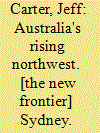

|
|
|
|
|
| Publication |
Sydney, Angus and Robertson Ltd, 1971.
|
| Description |
90p.;mapsHbk
|
| Standard Number |
020712146X
|
|
|
|
|
|
|
|
|
|
|
|
Copies: C:1/I:0,R:0,Q:0
Circulation
| Accession# | Call# | Current Location | Status | Policy | Location |
| 008985 | 910.13309413/CAR 008985 | Main | On Shelf | General | |
|
|
|
|
| 2 |
ID:
188826
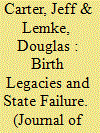

|
|
|
|
|
| Summary/Abstract |
We argue patterns of state failure are influenced by variation in how states emerged as independent political actors. In particular, states with positive birth legacies, those whose emergence required relatively high levels of capacity and legitimacy, should be less likely to experience state failure than countries that experienced less auspicious births. We assess this claim on the universe of states in the international system between 1950 and 2002 with multistate duration models that estimate the probabilities states transition into and out of periods of failure. We find that states with positive birth legacies are less likely to experience state failure and that this relationship is driven by states with positive birth legacies being able to more quickly transition from failure back to being functioning states. Our findings offer evidence that state failure is usefully thought of in the context of state-making processes and show that how states emerge as independent actors influences phenomena central to comparative and international politics.
|
|
|
|
|
|
|
|
|
|
|
|
|
|
|
|
| 3 |
ID:
138306


|
|
|
|
|
| Summary/Abstract |
How and why do regime type and interstate war affect government spending? We argue that a political leader allocates scarce resources between social and military expenditures as a function of their relative efficiency in securing her political survival. We derive four hypotheses concerning how mobilization for and demobilization from interstate war affects government spending differently in democratic and autocratic regimes. Compared to democracies, autocracies should increase military spending to a greater degree during wartime and decrease military spending to a greater extent following a war. Autocracies also should cut social spending more during an interstate war and increase social spending more during the process of demobilization from war than democracies. Our analyses of all states in the international system from 1950 to 2001 yield support for our hypotheses.
|
|
|
|
|
|
|
|
|
|
|
|
|
|
|
|
| 4 |
ID:
155190
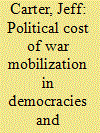

|
|
|
|
|
| Summary/Abstract |
Recent research concludes fighting or losing an interstate war is not costlier for democratic leaders than dictators, which implies most of our institutional explanations for differences in conflict behavior across regime type rest on empirically tenuous assumptions. I argue military mobilization, a fundamental but often overlooked aspect of war, should be costlier for democrats than dictators. Waging interstate war is associated with higher military spending and, often, lower social spending. Variation across regime type in the representation of the general public, civilian elite, and military in leaders’ winning coalitions should make democrats more likely than dictators to lose power given wartime patterns of government spending. This argument finds support during the period from 1950 to 2001. My findings provide microfoundations for a number of existing empirical results and suggest that differences in the conflict behavior of democracies and dictatorships should be largest when waging war requires a significant mobilization effort.
|
|
|
|
|
|
|
|
|
|
|
|
|
|
|
|
| 5 |
ID:
148160
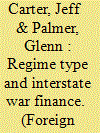

|
|
|
|
|
| Summary/Abstract |
Governments can finance the higher military spending associated with interstate war through a combination of cutting nonmilitary spending, imposing higher taxes, borrowing, and adopting an inflationary monetary policy. We argue that the incentives of survival-motivated leaders influence the strategies governments use to fund their war efforts and that regime type conditions the use of some finance strategies. Consistent with our expectations, we find that fighting an interstate war is associated with greater reductions in nonmilitary spending in dictatorships than in democracies and that contemporary democracies and dictatorships have largely avoided financing their wars through tax increases and inflation. We find little support for the argument that democracies finance their interstate wars through greater debt than nondemocracies.
|
|
|
|
|
|
|
|
|
|
|
|
|
|
|
|
| 6 |
ID:
113754
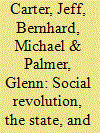

|
|
|
|
|
| Publication |
2012.
|
| Summary/Abstract |
Democracy has been the primary focus of our efforts to understand the impact of domestic institutions on processes of international conflict. In this article, we examine how a particular nondemocratic regime type, postrevolutionary states, affects military capabilities and war outcomes. Drawing on scholarship that conceptualizes revolutions as a unique class of modernizing events that result in stronger state structures, we argue that postrevolutionary states should be better able to mobilize populations and economic resources for military purposes. Tests performed on a comprehensive sample of twentieth-century states and interstate wars confirm our predictions: postrevolutionary states have larger, better funded militaries and achieve more successful war outcomes.
|
|
|
|
|
|
|
|
|
|
|
|
|
|
|
|
| 7 |
ID:
157365
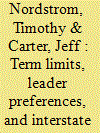

|
|
|
|
|
| Summary/Abstract |
Drawing on the idea that electoral accountability is a source for peace, recent scholarship claims that term limits result in democratic leaders who are systematically more likely to initiate conflicts. We consider a broader set of theoretical arguments that allow for the possibility that leaders’ preferences and the strategic environment condition the relationship between term limits and interstate conflict. These arguments suggest multiple hypothetical relationships between term limits and conflict, some of which are conditional on the hawkish or dovish nature of a leader’s preferences. Using a new, leader-year measure of term limits, we find that lame ducks—those incumbents legally prevented from serving as political executives in the following term—are less likely to initiate conflicts, on average, than their electorally accountable counterparts. This result holds among democratic leaders with dovish preferences but not democratic leaders with hawkish preferences, a finding consistent with theories of strategic conflict avoidance.
|
|
|
|
|
|
|
|
|
|
|
|
|
|
|
|
|
|
|
|
|